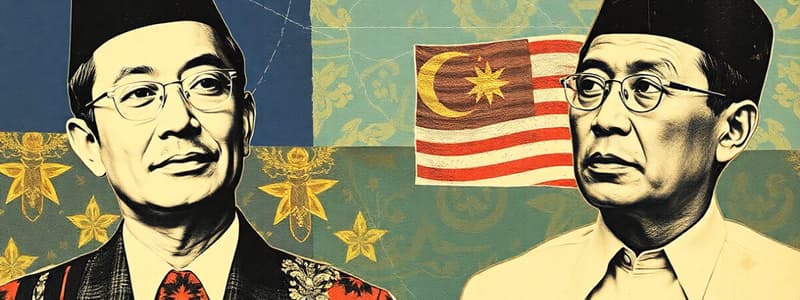Podcast
Questions and Answers
What was one of the main reasons for Tunku Abdul Rahman initially rejecting the merger with Singapore?
What was one of the main reasons for Tunku Abdul Rahman initially rejecting the merger with Singapore?
- Disagreement on the status of Borneo territories.
- The economic instability in Singapore.
- Concern over the dominance of a large Chinese population. (correct)
- Fear of losing Malay cultural identity.
What condition did Tunku Abdul Rahman set for accepting the merger with Singapore?
What condition did Tunku Abdul Rahman set for accepting the merger with Singapore?
- Inclusion of Borneo territories in the merger. (correct)
- Guarantee of a non-communist government in Singapore.
- Independence for Singapore from British rule.
- Economic aid from Singapore to Malaya.
What fear motivated Tunku Abdul Rahman regarding Singapore's potential independence?
What fear motivated Tunku Abdul Rahman regarding Singapore's potential independence?
- The rise of radical political parties in Singapore.
- Spread of communism from Singapore to Malaya. (correct)
- Loss of economic support from Singapore.
- Weakening of military defenses along the coast.
Which political group was Tunku Abdul Rahman particularly concerned about in Singapore during the Hong Lim By-Election?
Which political group was Tunku Abdul Rahman particularly concerned about in Singapore during the Hong Lim By-Election?
How did Tunku Abdul Rahman perceive the economic situation of Malaya if it merged with Singapore?
How did Tunku Abdul Rahman perceive the economic situation of Malaya if it merged with Singapore?
What was one of the factors contributing to the Tunku's concern about the influence of the PAP in Singapore?
What was one of the factors contributing to the Tunku's concern about the influence of the PAP in Singapore?
What implication did Tunku Abdul Rahman believe a merger would have on Malaysian security matters?
What implication did Tunku Abdul Rahman believe a merger would have on Malaysian security matters?
What political stance did the moderate group within the PAP support during Tunku Abdul Rahman's time?
What political stance did the moderate group within the PAP support during Tunku Abdul Rahman's time?
Flashcards are hidden until you start studying
Study Notes
Tunku Abdul Rahman's Shifting Stance on Merger
- Initially opposed merger: Tunku Abdul Rahman, leader of the Federation of Malaya, initially opposed merging with Singapore, fearing the large Chinese population in Singapore would threaten Malay rights and privileges.
- Concerns about Chinese influence: Tunku feared the Chinese population in a merged entity would outnumber Malay, making it challenging to uphold Malay rights and privileges, including accepting a Malay Sultan as head of state, Malay as the national language, and Islam as the state religion.
- Communism as a threat: The presence of a large Chinese population in Singapore heightened concerns about communist influence, which Tunku feared could spill over into Malaya.
- Shift towards supporting merger: Tunku later accepted the merger, but only on the condition that it included Singapore, Sabah, and Sarawak.
- Reasons for supporting merger: Tunku's stance shifted due to the potential economic benefits of a larger, more unified nation.
- Economic benefits: By merging with Singapore and Borneo territories, Malaya could leverage Singapore's economic strength and develop Borneo's resources, making Malaya a more prosperous country.
- Fear of Communist Singapore: The success of Ong Eng Guan, a former PAP member, in the Hong Lim by-election as an independent candidate and the perceived rise of the radical communist group within the PAP fueled fears of Singapore becoming a communist state.
- Influence on security: Tunku worried that an independent Singapore would give Malaya no influence on internal security matters, making the region vulnerable to communist influence.
- Control over communism: Tunku believed merging with Singapore would allow Malaya to control communist activity within the region.
- Preventing communist takeover: Tunku feared that a radical, communist-led Singapore would threaten the stability of Malaya.
Studying That Suits You
Use AI to generate personalized quizzes and flashcards to suit your learning preferences.


